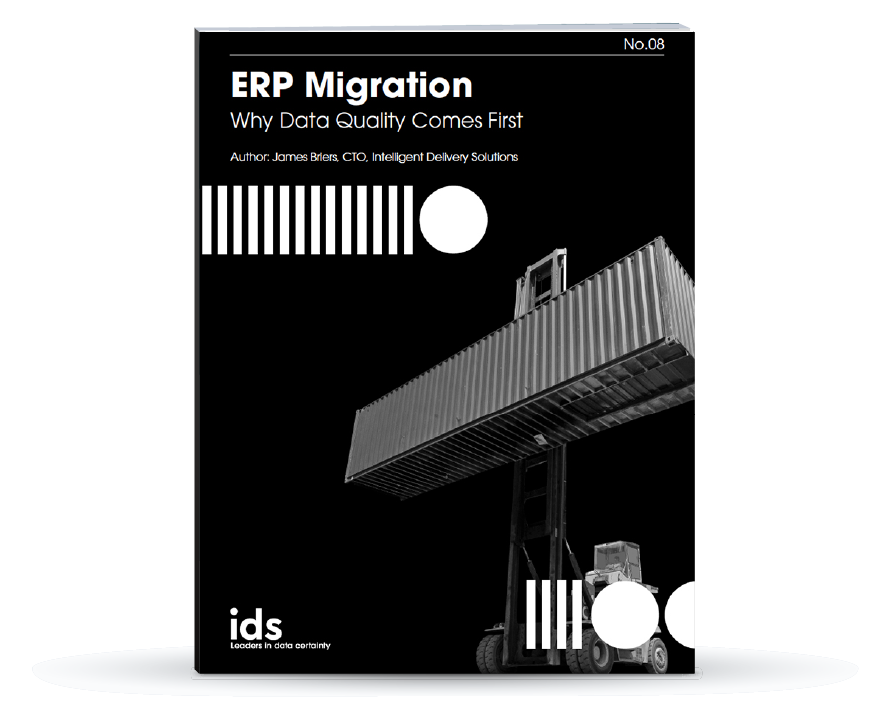The Key to a Successful ERP Implementation

Why CIOs Must Emphasize ERP Data Quality Management
Increased digitalization, globalization, cost reduction and responding to a dynamic, competitive landscape are just some of the main drivers for the decision to implement or upgrade a legacy ERP system by enterprises across a broad range of business sectors. However, it is not a decision that is without its challenges not least the solution cost but also in terms of the huge impact it can have on the whole organisation and the resources needed to ensure a successful implementation.
Why 50% of ERP Projects Fail
Various research projects suggest that up to 50% of ERP implementations fail the first time around due to a range of factors that can be put down to poor planning at the outset leading to overspend of budgets by three or four times, projects overrun due to mission creep and unplanned modifications, failure to gain stakeholder by-in but, above all, poor data quality.
A Gartner report published in 2020 found that “CIOs often put too little emphasis on data management before starting an ERP implementation” and “are not sufficiently aware of what data management actions need to be taken” and “struggle to keep ERP data in a high-quality state after an ERP implementation” thereby jeopardizing the timeline and the ultimate success of the project.
Enterprise resource planning (ERP) systems if implemented correctly can deliver major benefits to any organization, particularly large and medium sized enterprises but also, increasingly the SME sector. By integrating the core business applications and processes including manufacturing production, logistics, sales, marketing, finance, accounting and human resources under one central system it enables all departments to work with the same information and crucially one master system of record for all important company data.
By operating a central database of information across the whole business, ERP makes for an excellent business tool that is able to provide the total supply chain visibility and operational intelligence needed to support critical business decision-making and deliver increased efficiencies and improved productivity. However, this also means that incorporated data need to be accurate, complete, timely and consistent. Unless rigorous data quality management policies and procedures are established and maintained during the pre, and post implementation stages, any ERP system is doomed to fail to deliver on its key objectives.
Addressing Data Quality and Governance
The same Gartner report suggests that “data quality management is the number one challenge for any organization in the process of implementing a new ERP system” and “needs to be addressed before starting out by formalizing DQM within the project scope, emphasizing business outcomes and how the data impacts business processes.” It also recommends that data quality and governance processes need to be established as part of the ongoing business operations to keep ERP data fit for purpose when it moves to production.
By its very nature, every ERP system, whether in the public sector, health service, professional services, global enterprise or eCommerce sectors, can contain billions of pieces of data. Integrating such a diverse range of platforms, applications and data types means that data management requirements are increasingly complex making migrating data from the old to the new ERP system another major issue that the CIO needs to deal with.
Data Migration
The main goal of data migration is to ensure that data being migrated is cleaned of redundancy, duplicity, and relevance. It should be credible and arranged in a manner that can be further analyzed to represent the most accurate possible picture of a business’s health with particular emphasis on accuracy, consistency, validity and completeness.
Guaranteeing a Successful ERP Implementation
This can best be achieved by using the latest, augmented data quality and metadata tools such as IDS’ iData. Working together with ERP implementation partners whether migrating from legacy SAP or Oracle to the latest cloud-based version; implementing a composable ERP architecture; or managing the merger of two diverse organizations onto one platform, IDS' iData and unique Kovenant™ methodology can ensure 100% data certainty and guarantee a successful ERP implementation within budget and allotted time frame.

Why Data Quality Comes First Before any ERP Migration
IDS' Chief Technical Officer, James Briers, sheds light on the challenges facing consultancies must be aware of before committing to complex ERP migrations.


